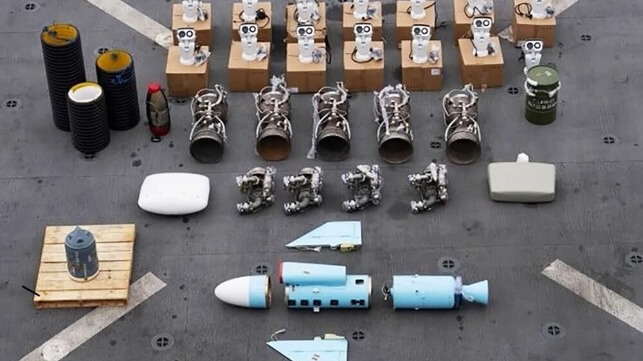FBI: Smuggling Vessel's Captain Was In Contact With Iranian Military

The FBI has evidence that the captain of a dhow caught carrying missile parts off Somalia had been in contact with the Islamic Revolutionary Guard Corps, the Iranian military division that handles covert overseas operations.
The January 11 interdiction received widespread media coverage because two Navy SEALs were lost at sea while attempting to board the dhow: one was washed off the ladder by a wave, and the other jumped in to save him.
The remaining members of the boarding party - a joint team of coastguardsmen and SEALs - continued the operation and searched the dhow for contraband. Though the dhow's crew told them that there was nothing illicit on board, the search party found high-tech Iranian missile components hidden amongst the dhow's gear belowdecks.
The Navy determined that the dhow was unseaworthy, rescued the crew and destroyed the vessel as a hazard to navigation. Out of the 14 rescuees, U.S. investigators arrested four on weapons-smuggling charges and detained the others as material witnesses. All have been transferred to the U.S. pending trial.
The boarding party retrieved considerable evidence from the dhow, including the Iranian missile components and the crew's electronic devices. Among other items, the search turned up a satellite phone belonging to the man that most crewmembers identified as the captain, Muhammad Pahlawan. (Pahlawan denies that there was any captain on the vessel.)
According to the FBI, the phone revealed that Pahlawan had had multiple contacts with a man he described as the vessel's "owner." This man, who Pahlawan identified by name, is known to U.S. intelligence as a member of the Islamic Revolutionary Guard Corps (IRGC).
The phone also showed that Pahlawan attempted to contact the IRGC operative twice while U.S. forces were closing in on the dhow.
Though Pahlawan denies that he was in charge of the vessel, crewmembers said that he controlled the dhow's heading during the voyage. One member of the crew told investigators that Pahlawan had ordered his subordinates to light the dhow on fire as a U.S. Navy boarding team approached, presumably to destroy evidence.

that matters most
Get the latest maritime news delivered to your inbox daily.
Pahlawan faces charges of intentionally transporting explosive materials intended for the purpose of causing serious injury or harm; and providing materially false information to a federal boarding officer. Three other crewmembers, including a man that Pahlawan identified as his brother, also face false-information charges.
All of the defendants and witnesses have denied knowledge of the arms shipment that was hidden belowdecks. The FBI believes that the cargo was loaded aboard after the ship departed its homeport, during a stopover near the Iranian naval base at Chabahar.
